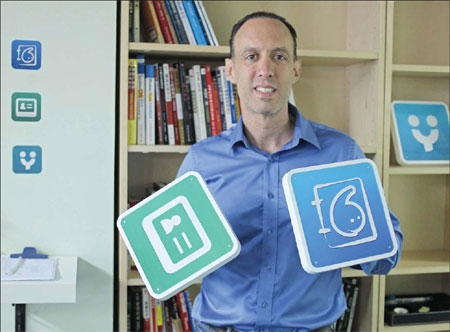No sitting down for startup buff
Updated: 2012-10-19 10:40
By Xiao Xiangyi (China Daily)
|
||||||||
|
Richard Robinson says he enjoys the challenges of starting new business in the Internet and mobile sector, while others may see it as a headache. Wang Jing / China Daily |
Richard Robinson has had plenty of success, but he can't help dabbling in new ventures
A startup company's path to success is often rocky at the beginning, and it takes an abundance of hard work to overcome the initial difficulties. But serial entrepreneur Richard Robinson can't help himself - he just keeps creating new businesses in the mobile and Internet sectors, and seems to enjoy the challenge of working with the limited resources of a new startup.
"I am happiest when I am fighting through the jungle, even with poisonous spiders or snakes, rather than running on the smooth freeway," says Robinson, standing on a swaying wobble board by his desk in the Beijing office of Yolu Co., Ltd.
The mobile-application development company is the fifth company in China co-founded by the 45-year-old American entrepreneur, and it is believed to have the brightest outlook of them all.
The hunger for a business professional network has been evinced by LinkedIn, which has grown to become the largest network of its type in the world.
Robinson and his team are attempting to cater to this demand by building Yolu (which literally means "friends' address book" in Chinese) into a mobile network for professionals.
There are very few successful start-ups that achieve exactly what they set out to in their original business plan. In practice, all companies need to adjust their business plans over time so they can bring in new ideas. Many fail before they can find the right path.
Robinson feels they have found the right path for Yolu, even though the original idea for the company - which he founded with the co-founder of Renren, China's biggest networking service, along with some other Chinese nationals - was to turn the mobile address book into a social network.
"Your mobile phone address book is really the ultimate social networking service but it's not really leveraged. The challenge is that the address book is a very crowded space that many companies want to control, like Tencent's Weixin, which is claimed to have more than 200 million users in China. That's how we realized the next thing to do is to focus on professional networking," he says.
By developing three mobile apps - Yolu Address Book, YConnect and Yolu Card Reader - Yolu has attracted millions of users based on word of mouth in the two years since its founding. After raising angel funding, seed funding and first-round capital, Robinson is now focused on bringing Yolu's products to the overseas market.
The company has been preparing for the launch of its fourth feature product, Yolu Conference, which will allow people to more easily make connections at conferences. Yolu will reveal this app next month at the Global Mobile Internet Conference in Silicon Valley, an industry group for mobile companies held by Great Wall Club (USA).
Robinson describes the app as a solution to the headache of going to a conference and exchanging business cards with the people you meet, and then having to deal with those piles of cards.
"In the age of smart phones, a paper business card is the silliest idea imaginable. People have to cut down trees, smash the wood, turn them into little right angles, print them and give them to others," he says, adding that the cards may be forgotten or even set aside in a pile and never digitized.
Yolu's application is based on the Yolu Card Reader, the company's most popular product. It is the world's first multi-lingual card reader that is able to move information with unprecedented accuracy from scanned cards into users' apps as well as the cloud. Even if users have lost their mobile phones, they still have the information in the cloud. If users have two cell phones, they can make sure their data are completely backed up and in sync.
"The most interesting part is if somebody in your traditional address book changes their information in the future, you may lose the connection with that person. But as long as someone else scans that person's new card with their new phone number or address, you will get the update from the system," says Robinson.
The concept of Dunbar's Number suggests that the average person will maintain stable relationships with about 150 people in his or her life. But this may not hold true for businesspeople, who may need to maintain and manage an unwieldy number of contacts.
"I had that headache myself," says Robinson, showing the 9,151 contacts he has in his cell phone. "So by doing all this we are trying to make pain pills instead of vitamin pills."
After graduating from the University of Southern California in 1989, Robinson spent three years working around the world on the ski slopes in Switzerland, as a bartender in the Virgin Islands, an English teacher in Prague after the revolution, a grape picker in France and a BMW assembly line worker in Germany.
"Then I took the train through Siberia and Mongolia to Beijing, and upon arrival I had a China epiphany. The dragon swooped down, as it were, dug her claws into me and hasn't let go since," he says.
Woody Allen once said that 80 percent of success is showing up. Robinson learnt that from his travels and decided to show up in Hong Kong in 1996 and make things happen. He originally planned to work in the Internet industry, but unfortunately someone forgot to tell the Internet industry to show up before he did. At the time there were very few Web users in Hong Kong and perhaps 50,000 Internet users on the Chinese mainland.
That was the beginning of Robinson's rollercoaster career in China. During his four-year stay in Hong Kong, he was one of the first executives of Renren 1.0, an early version of the service.
"We were involved in a crazy ride. Renren 1.0 went from zero to a public listing in 9 months. We raised $37 million, then it was worth $1.5 billion, then we sold the company. Suddenly I was so rich on paper with tens of millions of dollars. And then the NASDAQ crashed so I lost all that money overnight!"
Robinson went on to co-found computer and mobile digital device companies Mobile Interactive Games Ltd in 2001, ShouJi Mobile Entertainment and Dada Asia in 2006 and Kooky Panda Ltd in 2007. He sold his stakes in the first three to companies such as Tencent but is still on the board of Kooky Panda.
"My previous experience of riding a bicycle in Africa (from Kenya to Cape Town) and hitchhiking across Europe prepared me to be an entrepreneur much better than a desk job, because I was used to chaos and craziness," says Robinson.
He says every startup is an absolute mess, but in many areas, particularly in the Internet and wireless technology sectors, it is becoming much cheaper to start something up, especially compared with the dotcom boom of the late 1990s.
"It has become dramatically cheaper to start an internet or technology company since hardware costs have plummeted and open source software has become ubiquitous," Robinson says.
"This isn't simply a China phenomenon, but with the 'China price' helping to keep costs down and the natural entrepreneurship of staff it's not only cheaper to start a business in China, it's cheaper to fail here too."
xiaoxiangyi@chinadaily.com.cn
(China Daily 10/19/2012 page22)












